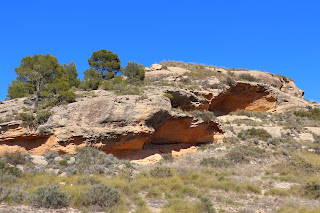Paintings and carvings on Monte Arabí

Monte Arabí is a natural park, about 20 kms out of Yecla, almost into Castilla la Mancha. It has some nice looking, rounded and very young, geologically speaking, Miocene rocks (10-12 million years old) and a bunch of trees and Mediterranean scrub. It's one of those places to wear the trousers you bought from Decathlon and to load a bottle of water, and maybe a bocadillo wrapped in silver paper, in your backpack. Mobile phones are a bit lost in the park - not much of a signal. I have to admit to not being a fan of most of the walks in this area. Ooh, look, a pine tree and some esparto grass, oh, and there's another pine tree. As Ivor Cutler said of the Scottish countryside - “We were soon well acquainted with the thistle, there are many thistles in Scotland”. I like Monte Arabí though because it's one of those places that has a long history of human settlement and I like the idea of continuity. The first time I was there, in 2011, I clambered up the hillside and peered thro...
